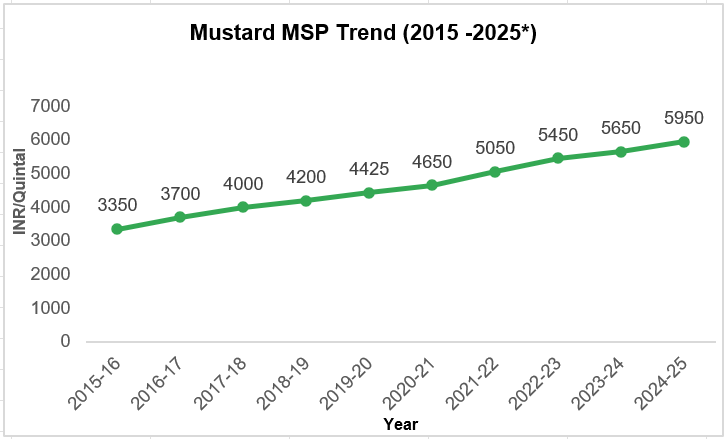The Union Cabinet has approved new Minimum Support Prices (MSP) for Rabi crops for the upcoming marketing season 2025-26, with wheat MSP increasing by Rs 150 per quintal to Rs 2,425; mustard MSP increased by Rs 300 per quintal to Rs 5,950; and chana MSP increased by Rs 210, bringing the new rate to Rs 5,650 per quintal.
Where, Minimum Support Price (MSP) , in simple terms defined as the price at which government procures the crop produce from farmers. Generally, MSP is announced by the government of India, at the beginning of Sowing season, its based on the recommendations made by Commission for Agricultural Costs and Prices (CACP).
Importance of MSP in Indian Agriculture Scenario:
- To Guarantee price for agricultural produce from government.
- To Support the farmers from distress sales.
- To procure food grains for public distribution.
Initially, two types of administered prices were announced:
- Minimum Support Prices (MSP): Provided long-term price guarantees to ensure that Agri -commodity prices did not fall below the fixed level, even during bumper crop years.
- Procurement Prices: Set for kharif and rabi cereals, at which the government procured grains for the Public Distribution System (PDS). These prices were usually higher than the MSP but lower than open market prices.
The dual-price system continued with variations until 1974 for paddy and briefly for wheat in 1975. In 1976 the policy was revised, and a single set of prices was announced for paddy and wheat, focusing on buffer stock.
This higher MSP for mustard and chana is projected to increase farmers’ returns and stimulate more cultivation of this oilseed, which is critical to India’s pulse and edible oil supplies.
Source: The Economic Times, vikaspedia, Commission for Agricultural Costs and Prices (CACP).
